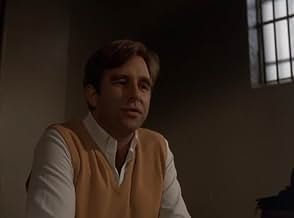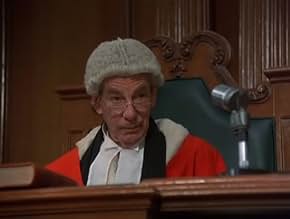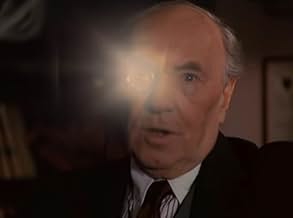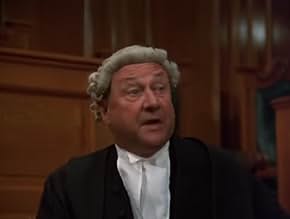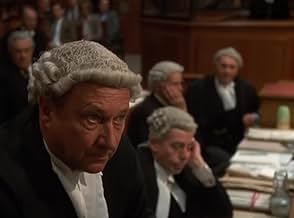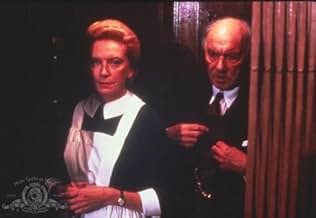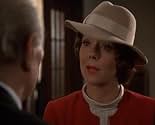CALIFICACIÓN DE IMDb
7.1/10
1.3 k
TU CALIFICACIÓN
Agrega una trama en tu idiomaLeonard Vole is accused of murdering an elderly rich woman, and the only alibi to him depends on his wife Christine.Leonard Vole is accused of murdering an elderly rich woman, and the only alibi to him depends on his wife Christine.Leonard Vole is accused of murdering an elderly rich woman, and the only alibi to him depends on his wife Christine.
- Dirección
- Guionistas
- Elenco
- Nominado a 1 premio Primetime Emmy
- 1 nominación en total
Ken Kitson
- Policeman
- (as Kit Kitson)
Opiniones destacadas
Everyone who has seen both versions will compare. Well, Charles Laughton and Tyrone Power in my opinion are better than Ralph Richardson and Beau Bridges. Charles Laughton simply is very funny. Tyrone Power performs a more shady character. But Diana Riggs is excellent, while Marlene Dietrich, much to my surprise and disappointment, is quite woody. The story in both versions are very alike. Though I haven't read the book, I assume they remain both quite close to it. So preference depends on the acting. I don't have one. I quite enjoyed both. The strength of the story is proved by the fact, that one can enjoy it even with knowing the real meaning of all the twists and turns.
Excellent TV version of the Agatha Christie classic with an amazing array of talent for this type of enterprise. This is the sort of high quality fare that was standard on American television in the 70s & 80s and is sadly missing today.
Bridges is okay but miscast. Leonard Vole needs to be played by someone with a slick charm as it was by Tyrone Power in the original, a persona like George Clooney projects now and Bridges while a capable actor doesn't have that quality.
Therefore he is easily put in the shade by the powerhouse team of Sir Ralph Richardson and Diana Rigg. Both give exceptional performances, Richardson sly, knowing and wise while Diana Rigg is perfect as the determined if misguided Christine. Deborah Kerr provides a nice light touch as Richardson nurse. Good fun all around.
Bridges is okay but miscast. Leonard Vole needs to be played by someone with a slick charm as it was by Tyrone Power in the original, a persona like George Clooney projects now and Bridges while a capable actor doesn't have that quality.
Therefore he is easily put in the shade by the powerhouse team of Sir Ralph Richardson and Diana Rigg. Both give exceptional performances, Richardson sly, knowing and wise while Diana Rigg is perfect as the determined if misguided Christine. Deborah Kerr provides a nice light touch as Richardson nurse. Good fun all around.
In 1958 Billy Wilder made one of the best film adaptations of an Agatha Christie story when he directed WITNESS FOR THE PROSECUTION, with Charles Laughton, Marlene Dietrich, Tyrone Power, Elsa Lanchester, and Una O'Connor. It is one of those mystery films that, even when you understand the trick, does not fail to remain entertaining. But it has to be done in a certain way, with a sense of decorum and tradition (personified by Laughton as Sir Wilfred Robarts - brilliant defense barrister but guardian of England's precious laws and sense of justice). It is infectious. Even Power as the seemingly helpless Leonard Vole is desperately hoping that the system of justice will save him.
But along comes this version of 1982. One would have thought it could not fail with a star like Sir Ralph Richardson as Robarts and Diana Rigg as Christine Vole. But it does fail. Even with Dame Deborah Kerr as Nurse Plimsoll and Dame Wendy Hiller as Janet Mackenzie (the Una O'Connor role)it fails. Richardson is too laid back for Sir Wilfrid. When Rigg testifies against her husband, after having previously given him an alibi for the murder, Richardson almost seems to tease her about her behavior. In the same situation in the Wilder film, Laughton's justifiable anger at this turnabout leads to a peroration point where he shouts out that she is a perpetual liar. It was far more affective with Laughton, although Richardson was (traditionally) a greater actor.
Similarly, Tyrone Power's Leonard Vole was (as I said when reviewing the 1958 film version)playing Leonard for all the part is worth, and created the most sinister part he played after his best performance in NIGHTMARE ALLEY as Stanton Carlyle. The last ten minutes of the film show what a totally amoral and vicious louse Power's Vole really is. Beau Bridges was as laid back as Richardson, making the mistake of making Vole seem a nice guy. Vole can be helpless in the arms of the British judicial system or he can be a louse. He can't be a guy you want to take out for a fishing expedition.
I give this film a "6" - barely because the cast tried. Their ideas were wrong in Richardson and Bridges' interpretations.
But along comes this version of 1982. One would have thought it could not fail with a star like Sir Ralph Richardson as Robarts and Diana Rigg as Christine Vole. But it does fail. Even with Dame Deborah Kerr as Nurse Plimsoll and Dame Wendy Hiller as Janet Mackenzie (the Una O'Connor role)it fails. Richardson is too laid back for Sir Wilfrid. When Rigg testifies against her husband, after having previously given him an alibi for the murder, Richardson almost seems to tease her about her behavior. In the same situation in the Wilder film, Laughton's justifiable anger at this turnabout leads to a peroration point where he shouts out that she is a perpetual liar. It was far more affective with Laughton, although Richardson was (traditionally) a greater actor.
Similarly, Tyrone Power's Leonard Vole was (as I said when reviewing the 1958 film version)playing Leonard for all the part is worth, and created the most sinister part he played after his best performance in NIGHTMARE ALLEY as Stanton Carlyle. The last ten minutes of the film show what a totally amoral and vicious louse Power's Vole really is. Beau Bridges was as laid back as Richardson, making the mistake of making Vole seem a nice guy. Vole can be helpless in the arms of the British judicial system or he can be a louse. He can't be a guy you want to take out for a fishing expedition.
I give this film a "6" - barely because the cast tried. Their ideas were wrong in Richardson and Bridges' interpretations.
This remake of the Laughton/Power/Dietrich film is quite enjoyable, owing to skillful casting, top production values, and, of course, Dame Christie's cracking good story. Sadly, the only liability is the performance of Sir Ralph Richardson (It's almost unspeakable to say this; I feel like Brutus plunging the knife into his Caesar). This was one of his last performances, and his immense skill simply cannot overcome his advanced age. (Granted, his character is supposed to be aged and ill, but Sir Ralph is unable to act intrigued and energized by his last case the way Laughton was in the original.) Still, his presence alone delivers barrels full of audience goodwill, and the piece is anchored by fine performances from Diana Rigg in the Dietrich role, Deborah Kerr in Elsa Lanchester's part (a fun bit of off-casting!) and by Beau Bridges, who stretches himself beyond his normal nice-guy blandness and convinces in the Ty Power role. A nice movie for a rainy afternoon or a boring holiday!
In 1954, when the efficient but bitter and stubborn barrister Sir Wilfrid Robarts (Ralph Richardson) returns to his office in London recovering from a heart attack, he is invited to defend Leonard Stephen Vole (Beau Bridges), who is the prime suspect in a murder case. Leonard is a former soldier that fought in World War II and is married with his beloved German wife Christine Helm Vole (Diana Rigg). He is unemployed and accused of seducing and murdering the wealthy middle-aged single woman Emily French (Patricia Leslie) to inherit 80,000 pounds. His unique alibi would be the testimony of Christine, which would not be accepted by the court, since she is his wife. Along the trial, Christine is surprisingly called to testify in court by the prosecution, when secrets about their lives are disclosed.
"Witness for the Prosecution" (1957) is another remarkable movie of Billy Wilder and one of the best about trial. Based on the play of Agatha Christie, the plot is perfectly tied-up without any flaw in the screenplay, which has many plot points and witty lines in a perfect combination of the caustic and sarcastic "British humor" with crime, drama and mystery. Despite being a good remake with great cast and performances, I do not understand the purpose of shooting frame-by-frame the masterpiece of Billy Wilder. The last time I had seen this film was on 14 June 2003. My vote is seven.
Title (Brazil): "Testemunha de Acusação" ("Witness for the Prosecution")
"Witness for the Prosecution" (1957) is another remarkable movie of Billy Wilder and one of the best about trial. Based on the play of Agatha Christie, the plot is perfectly tied-up without any flaw in the screenplay, which has many plot points and witty lines in a perfect combination of the caustic and sarcastic "British humor" with crime, drama and mystery. Despite being a good remake with great cast and performances, I do not understand the purpose of shooting frame-by-frame the masterpiece of Billy Wilder. The last time I had seen this film was on 14 June 2003. My vote is seven.
Title (Brazil): "Testemunha de Acusação" ("Witness for the Prosecution")
¿Sabías que…?
- TriviaThe 1957 version of this same material, starring Charles Laughton, Tyrone Power, Elsa Lanchester and Marlene Dietrich, directed and co-written by Billy Wilder, is widely considered a classic of the courtroom drama genre.
- ErroresIn the witness box, the maid Janet McKenzie states that September 14th 1954 was a Friday, which was her day off. That date was, in fact, a Tuesday.
- ConexionesEdited into Hallmark Hall of Fame (1951)
Selecciones populares
Inicia sesión para calificar y agrega a la lista de videos para obtener recomendaciones personalizadas
Detalles
- Fecha de lanzamiento
- Países de origen
- Idioma
- También se conoce como
- Agatha Christie's Witness for the Prosecution
- Locaciones de filmación
- Productoras
- Ver más créditos de la compañía en IMDbPro
Contribuir a esta página
Sugiere una edición o agrega el contenido que falta

